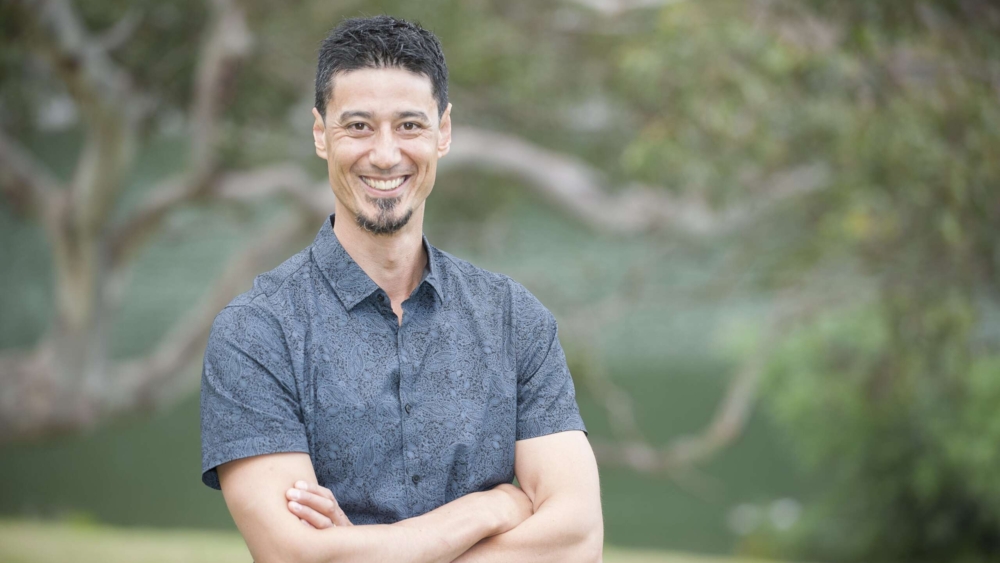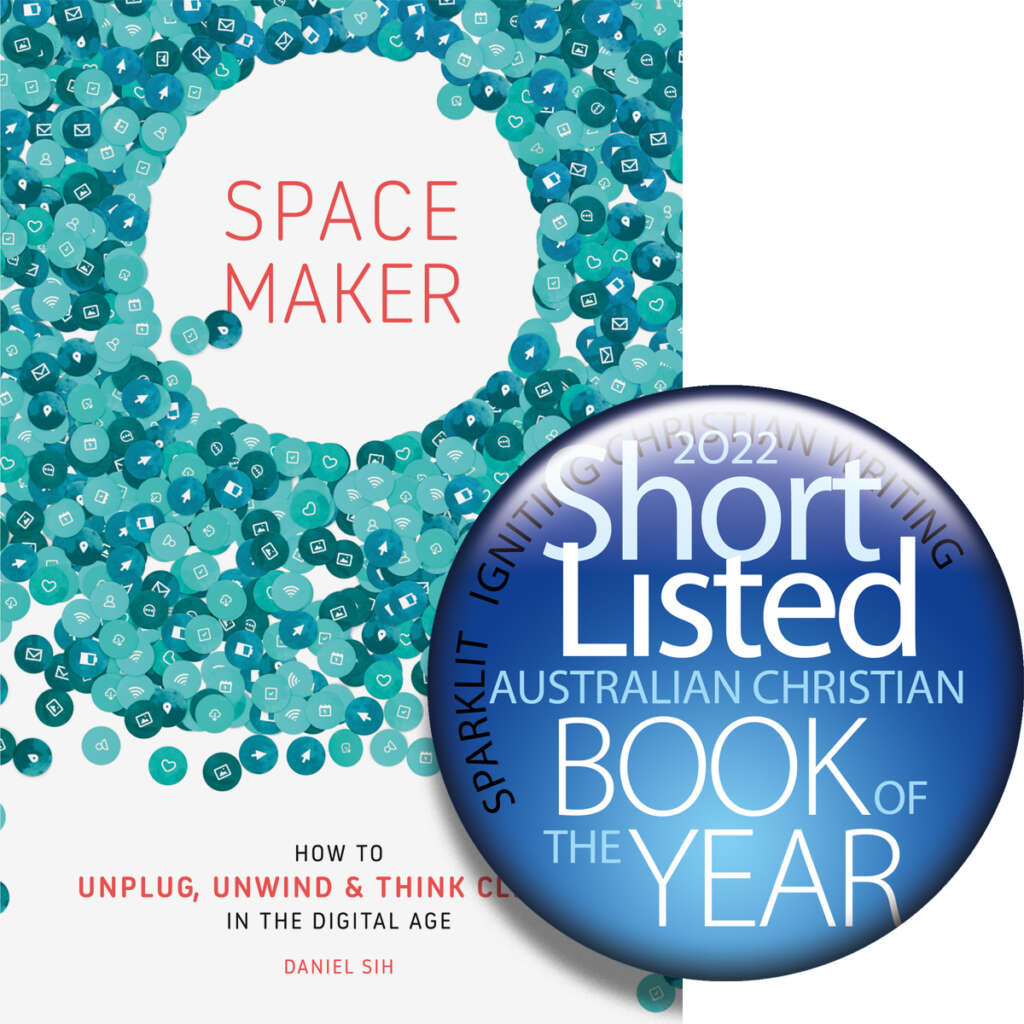Wired, tired and distracted? Here's the book we all need ...
Break the tech addiction and find space
When Daniel Sih started to have anxiety-related breathing problems, he realised he needed to create healthier habits of life. Spacemaker is the result – a book that shows you how to tame the iPhone and claim back space to rest, think, plan and breathe
Spacemaker: How to Unplug, Unwind and Think Clearly in the Digital Age is the most influential book I have read this year. As someone who has noticed my mood slump as I endlessly scroll social media, and who immediately reaches for my phone as soon as I wake up, I already knew I was addicted to digital devices, leaving me “wired, tired and distracted”, to use the author’s phrase.
So I was ripe for the diagnosis of this book that overuse of digital media is damaging our productivity and relationships, and we need to regularly unplug our devices to think clearly, rest, breathe and make space in our lives for the things that really matter.
Here are a few of its findings that amazed me:
All screen activities were linked to less happiness, and all non-screen activities were linked to more happiness in studies of teens by generational researcher Jean Twenge.
Having a smartphone on the table during a meeting affected the ability of 800 participants to problem-solve, even when it was switched off and face down.
When asked to spend 6-15 minutes alone in a sparsely furnished room without their phones, 67 per cent of men and 25 per cent of women preferred to self-administer an electric shock rather than have nothing to do but think.
“If we don’t examine our habits and our relationship with technology, then it’s very hard to look and act like Jesus.” – Daniel Sih
These are just three of the multitude of shocking findings Daniel quotes to show how wired to digital input and unable to slow down and address our inner world we have become since the introduction of the iPhone in 2007.
Its message is not anti-tech because, as a physiotherapist, businessman and a pastor, Daniel uses technology a lot. “It’s about recognising that we probably have an addiction to technology as Christians, and we underestimate some of the negative impacts that our habits are having on our lives,” he says.

Daniel Sih, the Spacemaker
As someone who has worked “bi-vocationally,” Daniel used his twin perspectives to write the book for two audiences, Christian and non-Christian. His success is shown in the fact that Spacemaker won the Australian Business Book Award for Personal Development in 2021 – and is shortlisted for the Sparklit Australian Christian Book of the Year 2022.
In it, Daniel presents ideas to recalibrate our habits, such as a daily pause at the beginning and end of the day, a daily refresh, a weekly day of rest, a seasonal day to think, and a digital detox.
“The key idea is that we need to make space in our lives to think and rest, plan and breathe, and that space is taken away from our lives because of our overuse of technology. So whenever we wake, we reach for our phone. Whenever we have a moment, we are gravitating towards our devices; and so much of the space we have for ourselves, for God, for our church community, our families is impacted by our relationship with our devices. So we need to rethink our relationship with the online world and make space, particularly from a Christian perspective,” he tells Eternity via Zoom from his home in Tasmania.
“I believe that the book is about discipleship because if we don’t examine our habits and our relationship with technology, then it’s very hard to look and act like Jesus. And it’s even harder to parent kids who will end up loving Jesus over the long haul because of technology’s impact on our formation as apprentices of Jesus.”
“I was getting my inbox to zero regularly and using a to-do list … But nothing was working.”
The need to slow down and create healthier patterns in his life hit Daniel during a crisis of overwork while he was working as a physiotherapist, leading a small church community a few days a week and at the same time, running a hobby business called Spacemakers, teaching people how to shift their habits to make space to be more productive.
“I started to have breathing problems,” he explains. “I started to be breathless at work, breathless when I was standing in front of others to present, I found myself then breathless at the dinner table and even breathless just reading picture books to my young kids.
“I had the tests, and I did medical examinations and realised that there’s nothing wrong with my heart or my lungs. It was an anxiety and stress-related illness. It was a kairos moment, a metanoia moment where God used that time to let me pause and ask myself questions about my patterns and rhythms of life.”
 After consulting a minister who had burnt out in a similar way a few years earlier, Daniel could see what might happen if he didn’t change his patterns of behaviour.
After consulting a minister who had burnt out in a similar way a few years earlier, Daniel could see what might happen if he didn’t change his patterns of behaviour.
“I got a mentor and I also looked at the Scriptures, and I started to see that Jesus and the disciples seemed to have this pattern and rhythm to their life, where they started with the Father, then they worked from a place of rest, rather than running to exhaustion and then crashing on the couch, metaphorically. So, obviously, patterns like prayer, like Sabbath and making sure that I invested in community and faith – and slowing down before my work – all became part of my experience, which eventually led to some of the practices in my book.”
About five years later, having already established some Sabbath practices and rhythms of resting and thinking in his life, Daniel found himself running out of space again.
“The business got busy and church started to grow, and I had extra kids, and I just got really squeezed. I felt hypocritical because I meant to be the Spacemaker, and I was technically doing the right things from an organisational perspective. I was getting my inbox to zero regularly and using a to-do list and prioritising my work, breaking projects down. But nothing was working.”
“I sensed God saying, ‘Give me the first fruits of your time and trust me in faith that I’ll work out the rest.'”
During a “huddle” – a coaching group with ministers – he found himself puzzling over the story of Elijah and the prophets of Baal in 1 Kings.
“God spoke to me through that. For the first time, I started to ask why Elijah poured out all this water onto the altar before God vindicated him with the flames, particularly because the whole showdown on Mount Carmel happened because it was a drought and there wasn’t any water.
“I used to think that the reason Elijah poured the water was to make the miracle more miraculous because obviously water stops the flame, but I felt God say ‘No, actually the water was a sacrifice.’ And by pouring out what he didn’t have, God brought the rain. That led me to ask the question, ‘Well, Jesus, what is it that you’re asking me to pour out, and what don’t I have?’
“I knew immediately the answer was time. I didn’t have space or time to think and rest and to keep on track of stuff and I sensed him saying, ‘Give me the first fruits of your time and trust me in faith that I’ll work out the rest. I’ll work out your busyness. I’ll work out your schedule. I’ll work out your work.’”
Daniel realised the principles of Sabbath embedded in the Scriptures are about giving the first fruits of our time to God, and so he determined to give the best of his time as a business person on Monday morning when everyone wanted to claim his attention.
“So I gave that to Jesus and said, ‘Okay, what do you want me to do with it?’ And we went walking on the mountain together near my house, and I prayed and I talked and I just enjoyed nature. I would drink a Thermos of ginger tea and sit on a mountain, and I’d look over the city and think and pray.”
“We have to submit our time to God as Christians in order to trust him with overwork.”
Daniel discovered that giving away each Monday morning proved the spiritual reality that time is not a commodity but our very identity.
“Firstly, I had some amazing God moments in that time, where I stopped doing some of the things that I was doing. And some of the things that I hadn’t thought of came to mind and new ideas sprung up, which helped grow my business and the ministry we had.
“Somehow, everything stabilised. My inbox got under control. When I needed work, work came; when I didn’t need work, it stopped. I started to realise that time is not an operational reality. It’s a spiritual reality because we actually don’t have time. It isn’t a resource like money. Oliver Burkeman, who wrote the book 4000 Weeks, says we get 4000 weeks, like 80 years – that’s it. So we are time. Our life is time, and therefore time is a spiritual reality because we’re spiritual people. And we have to submit our time to God as Christians in order to trust him with overwork. And that often means the kind of countercultural upside-down way of making decisions that we see in the Scriptures, where we do things that don’t make sense in a worldly perspective in order to find life in Jesus.”
All these ideas sound great in theory, so why is it so difficult to wean ourselves from our addiction to the internet and social media? Daniel believes that we have to start changing our paradigm of the world before we can look at the principles and practices of behavioural change.
“It’s not hard to understand how to turn off your phone. It’s hard to do in practice because of our beliefs, stories and paradigm. So that’s why we have to start there. So I would encourage people to start by reflecting on their relationship with the online world, what it means to them and why they gravitate so heavily towards using tech all the time.
“I also encourage people to do a digital audit and to actually work out how often they touch their phone, what they do first thing in the morning, what they do on the toilet, what they do in the shower, what they do around their kids, what they do when they’re on the bus – like a food diary. This gives you a sense of what your tech behaviours are in order to then have the data you need to start to examine your story, so that God can actually do a metanoia experience and you change your mind and your behaviour in response to this change in mindset.”
Start with very small, simple steps …
Once you’re convinced that you need to change your habits, then the next step is to start with very small, simple steps. Daniel recommends charging your phone outside of your bedroom and having 20 minutes at the start and end of each day to pray and to listen to God, “to just be silent and think about the day that’s coming or the day that’s been, the emotions you’ve had, what you can learn. If you’re married, then talk to your spouse in bed, rather than having a relationship with your phone together – you know, both playing Candy Crush or looking at Gmail instead of actually having pillow talk. Those moments are amazing and we lose relationally by having a relationship with our phone instead.”
The hardest practice to implement is undoubtedly the biblical idea of having a Sabbath day.
“It’s the most challenging and it is the most life-giving of all the Spacemaker habits because it comes from God. I know there are different perspectives theologically around whether Christians need to keep Sabbath … but I certainly would say that, at the very least, it is a good idea to give God a day of your time, the first fruits of your week, one day, a full 24-hour period, where you dedicate it to worship and rest, which I call rest and remembrance. And to ensure that you are rethinking the way in which you engage in technology as part of that commitment to love Jesus.”
The practice that he recommends as the most “winnable” is the digital-free meal, particularly for families, when everyone puts their phones aside to eat a meal around the table.
“For young people that habit of just eating together is transformational from a research perspective – it increases their learning, their numeracy and literacy skills. The research shows that if a teenage girl eats regularly with their family without technology, when they’re adults, they have less debt, they have fewer mental health issues, they have higher college entrance scores and they have more resilience. It’s unbelievable the benefits of connecting as real people with the people you love on a daily basis, making eye contact and talking with each other and investing in each other’s lives.”
“A lot of the pain that we experience in raising kids … is directly related to our inability to address technology overuse as a discipleship issue.”
Daniel was in celebration mode the day we spoke because he had just finished the last chapter of his next book, which is about raising tech-healthy humans.
“It’s about parenting and setting them up with tech in the tween years,” he explains. “I think that churches drop the ball on examining and critiquing discipleship. And a lot of the pain we experience in raising kids, and seeing them leave the faith, is directly related to our inability to address technology overuse as a discipleship issue. Because the habits that our young people form shape their brains and mould their spirits, and lead them to particular ways of seeing and thinking about the world that will draw them towards long-term faith or draw them away from faith.
“You know, what we give attention to grows and what we ignore dies away. When we look at the amount of time our kids spend reading the Bible as a habit versus watching YouTube videos and scrolling TikTok, it’s incomparable in terms of the influence on their heart and their mind and their soul and their worldview.”
Daniel Sih lives in Tasmania, Australia with his wife, Kylie, and their three children, Naomi, Caleb and Jethro. He also keeps 14 pure-bred chickens who eat a lot of grain and lay too few eggs.


